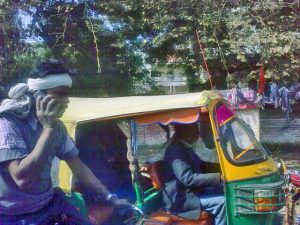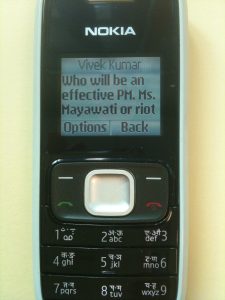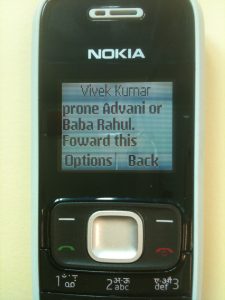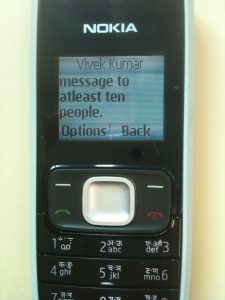Memo #177
By Robin Jeffrey (isasrbj [at] nus.edu.sg) and Assa Doron (assa.doron [at] anu.edu.au)
“We treated our precinct captains like gold,” wrote David Plouffe, an architect of President Obama’s 2008 US election campaign. “The challenge” lay in “marrying digital technology and strategy with a strong grassroots campaign.”
Plouffe’s insights had been anticipated a year earlier in an election in Uttar Pradesh, India’s largest state, where a party led by a Dalit (former untouchable) woman won unexpectedly. And the story about the centrality of technology and people came full circle early in 2012 when Uttar Pradesh voted to throw out the incumbent government.
In 2007, the surprising victory of the Bahujan Samaj Party (BSP) resulted from its use of mobile phones to link its vast cadre of dedicated workers. The BSP’s workers were overwhelmingly Dalits, united by outrage against the illegal discrimination they constantly face. In the past, BSP workers communicated with each other, and potential voters, only with great difficulty – by bicycle, postcards, telegrams, and rarely, telephones.
When the use of cheap mobile phones surged across India from 2004, BSP workers found a powerful new tool. In 2002, India had seven million mobile phones; by 2007, it had 200 million. “The mobile,” a BSP worker told a researcher in 2011, “has made it very easy for us to convey our message.”
Uttar Pradesh has 120,000 polling stations, and in 2007 the BSP had a mobile-phone-wielding captain working at thousands of them. In a low-turnout election (46 per cent of registered voters voted), they got their supporters to the polls and won 206 out of 403 seats.
In 2012, improved telecommunications were taken for granted and helped to produce the highest turnout (60 per cent) in Uttar Pradesh’s history. The BSP had plenty of mobile phones; but the leader had lost touch with the faithful and the BSP was reduced to 80 seats.
The rival Samajwadi Party energized its supporters, both by the sight of its leader’s son Akhilesh Yadav, on a bicycle and by the human touch that voices on a phone can provide. “Call me frivolous,” a journalist wrote, “but Akhilesh Yadav won because he cycled.”
About the Author:
Dr. Robin Jeffrey is at the Institute of South Asian Studies, National University of Singapore and Dr. Assa Doron is at the College of Asia and the Pacific, Australian National University.
Links:
- Celling South Asia: The Mobile Phone’s Impact on a Region (Special Issue), Pacific Affairs, September 2012. (Robin Jeffrey and Assa Doron are guest editors)
- Mobile-izing: Democracy, Organization and India’s First ‘Mass Mobile Phone’ Elections, The Journal of Asian Studies, February 2012. (By Robin Jeffrey and Assa Doron)
- Lessons from bicycle diaries, The Times of India, March 2012.
- The Great Indian Phone Book: How the Mass Mobile Changes Business, Politics and Daily Life, September 2012. (Book by Robin Jeffrey and Assa Doron)
- The Audacity to Win, 2009. (By David Plouffe)
- Why Did Mayawati Lose, Economic and Political Weekly, 2012. (Paid subscription required)
- Castes, Communities and Parties in Uttar Pradesh, Economic and Political Weekly, 2012. (Paid subscription required)
Related Memos:
- China Crucial to India’s Mobile Revolution (Memo #172, by Amitendu Palit)
- Our other Memos about India.



